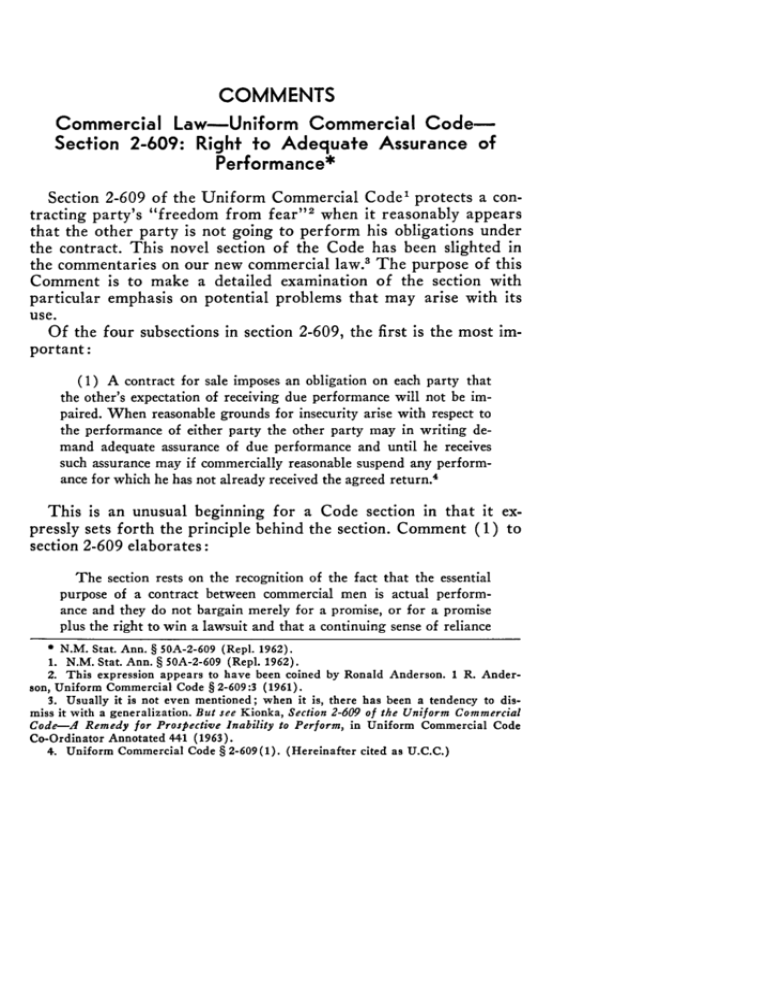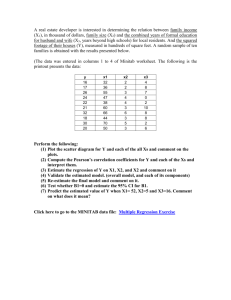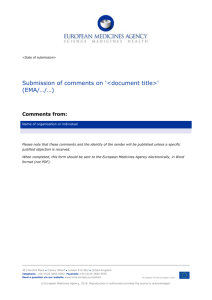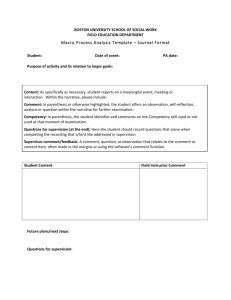
COMMENTS
Commercial Law-Uniform Commercial CodeSection 2-609: Right to Adequate Assurance of
Performance*
Section 2-609 of the Uniform Commercial Code' protects a contracting party's "freedom from fear" 2 when it reasonably appears
that the other party is not going to perform his obligations under
the contract. This novel section of the Code has been slighted in
the commentaries on our new commercial law.' The purpose of this
Comment is to make a detailed examination of the section with
particular emphasis on potential problems that may arise with its
use.
Of the four subsections in section 2-609, the first is the most important:
(1) A contract for sale imposes an obligation on each party that
the other's expectation of receiving due performance will not be impaired. When reasonable grounds for insecurity arise with respect to
the performance of either party the other party may in writing demand adequate assurance of due performance and until he receives
such assurance may if commercially reasonable suspend any perform4
ance for which he has not already received the agreed return.
This is an unusual beginning for a Code section in that it expressly sets forth the principle behind the section. Comment (1) to
section 2-609 elaborates:
The section rests on the recognition of the fact that the essential
purpose of a contract between commercial men is actual performance and they do not bargain merely for a promise, or for a promise
plus the right to win a lawsuit and that a continuing sense of reliance
* N.M. Stat. Ann. § 50A-2-609 (Repl. 1962).
1. N.M. Stat. Ann. § 50A-2-609 (Repl. 1962).
2. This expression appears to have been coined by Ronald Anderson. 1 R. Anderson, Uniform Commercial Code § 2-609:3 (1961).
3. Usually it is not even mentioned; when it is, there has been a tendency to dismiss it with a generalization. But see Kionka, Section 2-609 of the Uniform Commercial
Code-4 Remedy for Prospective Inability to Perform, in Uniform Commercial Code
Co-Ordinator Annotated 441 (1963).
4. Uniform Commercial Code § 2-609(1). (Hereinafter cited as U.C.C.)
NATURAL RESOURCES JOURNAL
[VOL. 7
and security that the promised performance will be forthcoming when
due, is an important feature of the bargain. 5
A contracting party's expectation interest in the other's performance was imperfectly protected under pre-Code law.' Anticipatory
repudiations had to be absolute and unequivocal;7 there was no
protection against mere uncertainty as to whether the other party
would perform.8 The Uniform Sales Act gave only slightly greater
protection than did the common law.' Although the merit in preserving expectations of due performance was familiar to pre-Code
law,' ° it had not yet found its way into the cases or statutes to any
significant degree."
That section 2-609 offers a regime of certainty where commercial
anarchy previously reigned, is one of that section's greatest merits.
Professor Llewellyan has said:
If there is one thing that makes trouble in . . . contracts of any
kind for future delivery, it is in situations where you are beginning
to wonder whether he [the other party to the contract] is going to
perform and you have not yet got up to the place . . . where you
can say either he is insolvent or he has repudiated ....
5. U.C.C. § 2-609, Comment 1. See also text accompanying note 37 infra.
6. Cosway, Sales-A Comparison of the Law in Washington and the Uniform
Commercial Code, 36 Wash. L. Rev. 50, 82-84 (1961) ; Lorensen, The Uniform Commercial Code Sales Article Compared with West Firginia Law, 64 W. Va. L. Rev. 260,
275-76 (1962).
7. Viramontes v. Fox, 65 N.M. 275, 335 P.2d 1071 (1959) ; 17 Am. Jur. 2d Contracts
§§ 448, 450 (1964), and the cases cited therein.
8. If anticipatory repudiation could not be established, both courses of action available to the aggrieved party were beset with risks: either he could proceed with his
own performance and risk a loss which he might never be able to recover, or he
could suspend his performance and risk being liable for breach of contract. Anticipatory repudiation is now covered by Section 2-610 of the Code.
9. See Uniform Sales Act §§ 53-55, 63 (2). The remedies of the Uniform Sales Act
were applicable to only a limited number of insecurity cases. Even then, they were
often available only after the damage had been done; in no way did they approach
the scope or effect of section 2-609. Kionka, supra note 3, at 448.
10. Some commentators, notably Williston, and the Restatement of Contracts argued
for the protection of a pre-anticipatory repudiation expectation interest. Shattuck, Contracts in Washington, 1937-1957, 34 Wash. L. Rev. 467, 474 (1959) ; Wardrop, Prospective Inability in the Law of Contracts, 20 Minn. L. Rev. 380, 400 (1936) ; 6 S. Williston, A Treatise on the Law of Contracts § 875 (3d ed. 1962) ; Restatement of Contracts §§ 280, 323 (1) (1932).
11. W. Willier & F. Hart, Forms and Procedures Under the Uniform Commercial
Code
24.31 (1963) ; Cosway, supra note 6; 1 Report of the New York Law Revision
Commission, Study of the Uniform Commercial Code 535 (1955) ; Kionka, supra note
3, at 455.
COMMENTS
JULY 1967]
Section 2-609 gives you the werewithal [sic] for finding out where
you are within a reasonable time. This is certainty. This is the kind
of certainty that eliminates litigation that has to go to the Appellate
Court.
12
Section 2-609 has also been complimented because it conforms to
the desires and practices of businessmen.' 3
The section, however, is not without its problems. One of the
most salient is assigning the proper definition to the term "due performance." This expression is not found in any section of the Code
except 2-609 and neither the text nor the comments attempt to define it.1 4 According to one commentator, due performance "must be
understood to mean one hundred per cent performance, since that
is what is 'due.' "'3 Although admitting that "due" may also mean
"appropriate," "proper," or "suitable," he maintains that due performance must mean total performance, since only total performance is "appropriate," "proper," or "suitable."'" Besides being
circular, this definitional approach is inconclusive since the word
"due" may very well admit of qualification. "Due" also means
''enough" or "adequate," as in the expressions "due time" or the
quasi-legal "due care."' 17
If the Code draftsmen did intend that due performance mean
100 per cent performance, support for such a proposition must be
found outside the dictionary. Section 2-601 provides that if goods
or tender of delivery fail in any respect to conform to the contract,
the buyer may reject the whole.' This might indicate the Code's
12. Report of the New York Law Revision Commission, Hearing on Article 2 of
the Uniform Commercial Code 162 (1954).
13. D. Carroll & F. Whiteside, Forms for Commercial Transactions Under the
Uniform Commercial Code, ch. 101(36) (1963) ; Report of the New York Law
Revision Commission, supra note 12, at 153; Cosway, supra note 6, at 84.
14. The case law is of virtually no help in resolving the various difficulties that
arise with section 2-609. To date, only three cases have invoked this section in their
ratio decidendi and each was quite routine, at least as far as section 2-609 issues were
concerned. Products Unlimited, Inc., 3 U.C.C. Rep. Serv. 620 (Callahan & Co.) (V.A.
Contract App. Board 1966) ; Lockwood-Conditionaire Corp. v. Educational Audio
Visual, Inc., 3 U.C.C. Rep. Serv. 356 (Callahan & Co.) (N.Y. Sup. Ct. 1966) ; Wrightstone, Inc. v. Motter, 11 Cumb. L.J. 165 (Cumberland County Ct.) 1 U.C.C. Rep. Serv.
170 (Callahan & Co.) (1961).
15. Anderson, Repudiation of a Contract Under the Uniform Commercial Code,
14 De Paul L. Rev. 1, 7 (1964).
16. Id.
17. Webster, New World Dictionary of the American Language 448 (College ed.
1964).
18. U.C.C. § 2-601 (emphasis added).
NATURAL RESOURCES JOURNAL
[VOL. 7
commitment to a view of total performance were it not for the fact
that section 2-601 is expressly made subject to the requirement of
section 2-612 that performance substantially impair the value of the
contract. Furthermore, comment (2) to section 2-106 intimates that
total performance is meant only as a requirement of acceptance.
Due performance should not be construed to mean 100 per cent
performance. Such an interpretation causes an internal conflict between sections 2-609 and 2-610 that should not be ascribed to the
draftsmen. According to section 2-610, if there has been a repudiation of the contract, the aggrieved party cannot suspend performance unless the repudiation substantially impairs the value of the
contract to him. A repudiation is sufficient to warrant a request for
assurances under section 2-609.19 Thus, if due performance means
total performance, the aggrieved party in a repudiation situation
can evade the requirements of section 2-610 by ignoring that section
and proceding under section 2-609. He thereby gains a remedy that
section 2-610 never intended him to have, namely, the right to
suspend performance when the repudiation does not substantially
impair the value of the contract.
There is even less justification for saying due performance means
"substantial performance" than for saying it means total performance. The best statement of substantial performance is found in section 275 of the Restatement of Contracts. It calls for a complicated
evaluation of a great many variables to determine whether there
has been a material failure to perform which excuses the other
party. It is concerned with a different phenomenon than is section
2-609. The Restatement is trying to salvage the remains of a contract that has already been breached; the Code is trying to provide
security before there has been any breach.
One commentator correctly insists that:
"due performance" specifically does not mean "substantial performance." [The Code seems to exclude] the doctrine of substantial per-
formance from the law of contracts for the sale of goods. If other
Sections have excluded the doctrine of substantial performance from
the remainder of the Code, it would be illogical to say that the
ambiguous expression "due performance" has incorporated the doc20
trine into the present Section.
19. U.C.C. § 2-611, Comment 2.
20. Anderson, sutra note 15, at 7.
JULY 1967]
COMMENTS
A third possible meaning of due performance is performance
which does not substantially impair the value of the contract to the
aggrieved party. According to the Code, "the most useful test of
substantial value is to determine whether material inconvenience or
injustice will result if the aggrieved party is forced to wait and receive an ultimate tender minus the part or aspect repudiated. ' 21 Substantial impairment of the value of the contract is the Code's
method of protecting a party's expectations when it appears he will
not receive the performance for which he bargained. The Code
applies this standard when there has been an anticipatory repudiation,22 when a non-conforming installment impairs the value of future installments,23 and when a buyer is notified of a material delay
caused by the occurrence of a contingency the non-occurrence of
which was a basic assumption on which the contract was made. 24 It
would appear that this test should also be used as a working definition of "due performance," as that expression is used in section
2-609.25
This interpretation would mean that a party cannot rightfully
demand assurance and suspend performance unless his reasonable
grounds for insecurity are such that, if realized, they would substantially impair the value of the contract to him. This accords with the
Code's policy of keeping contracts going; it also helps prevent
abuse of section 2-609 by inhibiting frivolous demands for assurance. In addition, there would be no inconsistency between sections
2-609 and 2-610 as would be true if due performance were rendered
to mean 100 per cent performance.
The same results might be achieved by more circuitous arguments
were due performance construed as meaning total performance. For
example, even if due performance requires 100 per cent performance, it might be held that there can be no "reasonable grounds for
insecurity" about the other party's performance unless that insecurity, if realized, would substantially impair the value of the contract.
Or, from another tack, it could be argued that suspension of per21. U.C.C. § 2-610, Comment 3.
22. U.C.C. § 2-610.
23. U.C.C. § 2-612.
24. U.C.C. § 2-616.
25. That the Code recognizes an affinity between these situations and section 2-609
is illustrated by its concurrent discussion of them in Comment 1 to section 2-610.
For a discussion of the distinction between this test and "substantial performance,"
see Anderson, supra note 15, at 8.
NATURAL
RESOURCES JOURNAL
[VOL. 7
formance is not "commercially reasonable" unless the value of the
contract to the aggrieved party would be substantially impaired.
Another problem of section 2-609 is that the parties can sometimes be secure (a condition that the section seeks to advance) only
by failing to assert the very rights granted them by section 2-609.
To begin with, an aggrieved party's right to demand assurance and
suspend performance is generated by the reasonableness of his
grounds for insecurity. A subsequent judicial determination that
these grounds for insecurity were unreasonable, or that his suspension of performance was not in compliance with commercial standards, means that his own failure of performance constituted a
breach of contract. 2 The prudent aggrieved party will therefore
defer any suspension of performance at the time he demands assurance, unless he is reasonably certain of his own position. The real
"moment of truth" arrives when the thirty-day waiting period
elapses without assurance having been furnished. This appears to be
a repudiation under section 2-609 (4) and even the cautious businessman, once he has demanded assurances, is likely to suspend performance at this point. It must be remembered, however, that if the
original grounds for insecurity are subsequently invalidated, the
other party's failure to give assurance has no consequences whatever.
To take another situation, suppose it appears the aggrieved party
has no reasonable grounds for his claimed insecurity; either he is
unduly worrisome or he is attempting harassment tactics. To be
secure, the other party must comply with the demands despite his
conviction that the aggrieved party is not entitled to assurance. If
the aggrieved party's demands are subsequently determined to have
been reasonable, failure to give assurance was a repudiation of the
contract.27 If only an additional promise of future performance is
demanded, the other party will be little inconvenienced by granting
it. On the other hand, if the posting of a guaranty or some other
burdensome form of assurance is requested, considerable hardship
may be worked by providing it.
An even more difficult situation arises where an honest dispute
exists between the parties over an ambiguous term in the contract.
Suppose both parties demand assurances and refuse to perform except in accordance with their own interpretation of the ambiguous
26. 1 R. Anderson, supra note 2, § 2-609:5; Stockton, Sales Under the Uniform
Commercial Code: Significant Changes, 20 Ala. Lawyer 352, 369 (1959).
27. Anderson, supra note 15, at 5.
JULy 1967]
COMMENTS
term. If the contract is litigated, the court must construe the term;
that party who gave it an incorrect meaning before the litigation
will probably be held to have repudiated the contract by failing to
give the demanded assurances. Granted, the court must decide the
case. Unfortunately, it is not necessarily correct to say that the misinterpreting party acted unreasonably or in bad faith. From the
businessman's standpoint it is conceivable that an ambiguous term
may have more than one commercially reasonable interpretation.
For this reason, parties disputing a contract term should be particularly chary of invoking section 2-609. A wiser course of action would
be to place oneself under the aegis of section 1-207: compliance
with the other party's demands "under protest" and with reservation of rights.2
Another potential troublespot in section 2-609 is the distinction
made between merchants and non-merchants.2 9 Section 2-609(2)
reads: "Between merchants the reasonableness of grounds for insecurity and the adequacy of any assurance offered shall be determined according to commercial standards." This section clearly
implies that when one or both parties are non-merchants, they are
not governed by commercial standards, but by some other standards.
What are these other standards? They must include at least the
requirement of good faith ;30 beyond this minimum there is uncertainty.
Perhaps the standards for merchants and non-merchants are substantially identical, that is, non-merchants should also be held to
commercial standards. Supporting this interpretation is section 2609 (1) which prohibits all parties from suspending performance
unless it be "commercially reasonable." This indicates that the
draftsmen were not averse to holding non-merchants to commercial
standards. Because of the relative novelty of section 2-609 and the
procedural steps required before a repudiation arises thereunder, it
is likely that only parties familiar with the Code (or their attorneys)
28. U.C.C. § 1-207:
A party who with explicit reservation of rights performs or promises performance or assents to performance in a manner demanded or offered by the
other party does not thereby prejudice the rights reserved. Such words as
"without prejudice", "under protest" or the like are sufficient.
29. For the Code's definition of "merchant" and "between merchants," see U.C.C.
§ 2-104(1), (3).
30. "Every contract or duty within this Act imposes an obligation of good faith in
its performance or enforcement." U.C.C. § 1-203.
NATURAL
RESOURCES JOURNAL
[VOL. 7
will utilize it. To require that these persons conform to commercial
standards probably does not impose an undue hardship upon them
regardless of whether they fit the restrictive definition of "merchant" in section 2-104. Despite the merit in requiring that anyone
who uses section 2-609 adhere to commercial standards, it must be
recognized that any such interpretation disregards the clear implication of section 2-609 (2), namely, that merchants and non-merchants
are held to different standards.
The negative implication in one of the comments 31 is that nonmerchants are held to something called "legal standards," but no
clue is given as to what they are. One writer has suggested that "presumably a standard more in line with the understanding of the
parties will be used if one or both of them do not fit the definition of
the term 'merchant'." 3 2 The helpfulness of this suggestion is doubtful. Perhaps the non-merchant standard extends no further than the
concept of reasonableness. 3 Might this be what comment (3) referred to as "legal standards" ?
One of the official comments to section 2-609 raises a serious
problem about the scope of that section. Comment (3) states that
when a buyer learns from an apparently trustworthy source that the
seller has shipped defective goods or is planning to ship them, he
cannot have reasonable grounds for insecurity in a cash against documents sale. He has, according to the comment, assumed the risk of
payment before inspection of the goods and that risk is not to be
evaded by a demand for assurances.8 4 Hawkland, a leading commentator, agrees, and attempts to buttress the argument by claiming
that if this were not true, the principle of the pure documentary
sale would be destroyed.35 Both comment (3) and Hawkland conclude that only unassumed risks are fodder for a reasonable grounds
for insecurity.3 6
Comment (3)'s interpretation of the section seems incorrect. It is
contrary to the purposes of section 2-609 as expressed both by the
31. U.C.C. § 2-609, Comment 3.
32. Kionka, supra note 3, at 445.
33. The good faith requirement, of course, is always present. U.C.C. § 1-203.
34. U.C.C. § 2-609, Comment 3.
35. 1 W. Hawkland, A Transactional Guide to the Uniform Commercial Code
§ 1.3601, 196 (1964).
36. "This risk is not to be evaded by a demand for assurances." U.C.C. § 2-609,
Comment 3. "A party is not reasonably threatened by the very risks he has assumed
under the contract." 1 W. Hawkland, supra note 35.
JuLy 1967]
COMMENTS
section itself8 7 and the comments thereto.8 A seller's due performance in a documents sale is not just to deliver any goods; it is to
deliver goods conforming to the contract. That the terms of a document sale delay a buyer's verification of conformity until after payment does not diminish the seller's obligation to furnish conforming
goods. Moreover, the statement that an aggrieved party cannot demand assurances when he is a documents buyer is inconsistent with
other fact situations that the comments suggest are appropriate
places to demand assurances. Comments (1) and (4) both provide
that where the contract calls for a delivery on credit, the seller may
utilize section 2-609 if he has reasonable grounds for insecurity as
to the buyer's ability to pay. Yet, the logic of comment (3)'s approach to document sales says that credit sellers can never demand
assurances when their insecurity stems from a fear that the buyer
will not or cannot pay for the goods. By selling on credit the seller
would supposedly assume the risk that the buyer would be able to
pay within the credit period after the goods are delivered.
The same principles which allow a credit seller to demand assurances should allow a documents buyer to demand them. If the insecurity about the other party's future performance is reasonable,
why deny the protection of section 2-609 by the specious logic of
assumption of risk? Why claim that without comment (3)'s interpretation the principle of the pure documentary sale would be destroyed? One might as well say that with the interpretation of
comments (1) and (4), the principle of the pure credit sale is destroyed.
In fact, there is no destruction in either case. Most transactions
will be unaffected. When insecurity does arise, the grounds for it
and the adequacy of any assurance demanded must be tested against
the requirements of good faith, reasonableness, and (as between
merchants) commercial standards-all within the context of the
credit or documentary transaction at hand. Rarely will a credit
37. "A contract for sale imposes an obligation on each party that the other's expectation of receiving due performance will not be impaired." U.C.C. § 2-609 (1).
38. U.C.C. § 2-609, Comment 1:
[T]he essential purpose of a contract between commercial men is actual performance and they do not bargain merely for a promise, or for a promise
plus the right to win a lawsuit[;] a continuing sense of reliance and security
that the promised performance will be forthcoming when due is an important
feature of the bargain.
See also text accompanying note 5 supra.
406
NATURAL RESOURCES JOURNAL
[VOL. 7
seller be justified in demanding that the buyer post bond or accelerate payment; rarely will the documents buyer be justified in
demanding inspection of the goods prior to payment. In most cases
an adequate assurance will fall short of these extremes; where it
does not, that particular credit or documents sale should be "destroyed."
The problems discussed in this Comment have not yet been
litigated. But, if the section is to perform its stated purpose, some
or all of these questions will have to be answered. As long as the
basic policy behind section 2-609 is kept in mind, there need be no
emasculation of this highly beneficial provision of our new commercial law.
RALPH D. SMITH





